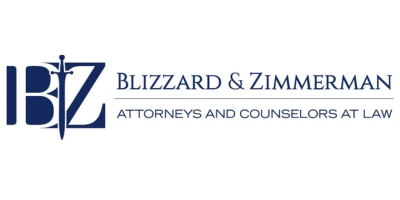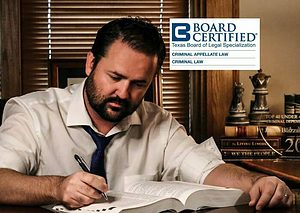We do get questions from time to time about what a board certified attorney is.
Here at Blizzard and Zimmerman Attorneys, Jacob Blizzard is Board Certified by the Texas Board of Specialization for not only Criminal Law but also Criminal Appellate law.
These are two related but separate areas of law.
He is one of only 87 attorneys out of 100,000 attorneys in the state of Texas certified in both Criminal Law and Criminal Appellate Law.
But what does Board Certified mean?
Here we’ll look at the Texas Criminal Law Board Certification.

In Texas, a board certified attorney is an attorney who has gone beyond the minimum standards and competency in a particular area of their practice as designated by the Texas Board of Legal Specialization. The Board is a part of the State Bar of Texas.
The requirements have been established by the Supreme Court of Texas. The attorneys who receive the designation have passed an established process to achieve the certification.
This certification process is individual and voluntary and takes two steps:
- The board certification application, (see Standards that must be met to even apply below)
- And a 6-hour written examination.
According to the Texas Board of Legal Specialization in a communication to Jacob, “Being Board Certified is a prestigious accomplishment that puts you (Jacob Blizzard) alongside an elite group of attorneys in Texas. In fact, out of more than 100,000 attorneys licensed to practice law in the state, only 7,200 are Board Certified.”
In addition, only Board Certified lawyers have the right to publicly represent themselves as a specialist in up to 25 areas of law, a demonstration to your clients that you are a true expert in your respective area(s).
It is one of the most respected achievements a Texas attorney can attain and some of the best attorneys out there carry this designation.
In Texas, a board certified attorney is an attorney who has gone beyond the minimum standards and competency in a particular area of their practice as designated by the Texas Board of Legal Specialization (TBLS). The Board is a part of the State Bar of Texas. The requirements have been established by the Supreme Court of Texas.
The attorneys who receive the designation have passed an established process to achieve the certification.
This certification process is individual and voluntary and takes two steps: the application and a 6-hour written examination.
The general standards for Criminal Law certification may be found here for review.
From the Texas Board of Legal Specialization:
Why Choose a Board Certified Lawyer?
Board Certification is a mark of excellence and a distinguished accomplishment within the Texas legal community.
Consumers and organizations get the highest quality of legal services when working with Board Certified lawyers — having substantial experience, the respect of their peers, and proven specialized competence in their select area of law. Out of 110,000 lawyers that are licensed to practice in Texas, only 7,150 are Board Certified.
These lawyers have voluntarily applied for Board Certification, have:
-
- A minimum of 5 years of law practice experience (with at least three years in specific legal areas),
- Completed at least 60 hours of continuing legal education hours,
- And passed a rigorous exam.
Once certified, these lawyers meet additional criteria to continue their education and involvement in their specialty area as well as reapply for Texas Board of Legal Specialization Board Certification every 5 years.
Here are a few of the standards which must be met.
The Criminal Law Certification defines criminal law as the practice of law dealing with, by way of definition, not limitation, matters involving:
- Legal aspects of pretrial release
- Examining trial, indictment, information, and complaint
- Change of venue; continuance
- Severance
- Discovery
- Speedy trials
- Jeopardy
- Immunity
- Confessions
- Search and seizure
- Identification
- Competence to stand trial and culpable mental state
- Jury voir dire
- Rules of evidence- state and federal (e.g., impeachment, extraneous offenses, etc.)
- Procedure and rules of evidence at punishment hearings
- U. S. sentencing guidelines
- Law of sentences
- Legal aspects of plea bargaining and guilty pleas
- Motions for a new trial
- Motions for the arrest of judgment
- Appeals
- Post conviction remedies
- Probation and parole granting
- Probation and parole revocation
- Executive clemency
- Death penalty
- Other substantive criminal offenses
- Juvenile crimes
What are the requirements to become TBLS Board Certified?
To become Board Certified attorneys here in Texas must have:
- Been licensed to practice law for at least five years.
- Devoted a required percentage of practice to a specialty area for at least three years.
- Handled a wide variety of matters in the area to demonstrate experience and involvement.
- Regularly attended educational seminars to stay current in their legal training.
- Been evaluated by fellow lawyers and judges.
- Successfully passed a six-hour written examination.
As part of the certification process, the attorney who is applying for certification in Criminal Law must meet several standards.
The applicant must have devoted a minimum of 25% of his or her time practicing criminal law in Texas during each year of the 3 years preceding application.
They also have to list the number of Texas criminal law matters they have participated in:
- State felony jury trials
- State misdemeanor jury trials
- Federal jury trials
- State appeals
- Federal appeals
- State and federal non-jury trials
- State and federal pleas of guilty
- State and federal post-conviction remedies
- State death penalty (trial, appeal; and/or habeas)
- Juvenile proceedings
- Dismissals
- Grand jury no bills
- Cases decided on pre-trial motions where evidence was presented (such as motions to suppress evidence
- Probation or parole revocations; and
- Other criminal law matters not listed above.
In addition to the above, the attorney must have handled as lead counsel a minimum number of Texas criminal law cases in 3 of the following categories:
- 5 state felony jury trials.
- 10 state misdemeanor jury trials or 5 state felony jury trials in addition to those listed above.
- 5 federal jury trials or substantial involvement in 10 federal cases in which there was a contested issue that required the applicant to file pleadings or a memorandum of law (or both) on behalf of the client and that resulted in the granting of relief without a hearing or in an adversarial hearing with the trial court having to resolve a contested issue of law or fact. “Contested issues” could include anything from the legality of a search to the appropriateness of a sentence.
- Any combination of 5 state or federal appeals.
In addition to the points of experience notated above, the attorney must also provide references.
- Provide a minimum of 5 names and addresses of persons to be contacted as references to attest to their competence in criminal law. They must include four Texas attorneys who are substantially involved in criminal law. The attorney who is applying must have tried a criminal law matter with or against one of these attorneys.
- They also must include one judge of any court of record in Texas before whom they have appeared as an advocate in a criminal law matter.
In addition to the experience and reference points listed above, the attorney must also show that they have continued proficiency by attending continuing legal education classes after becoming licensed to practice law. That means they must complete a minimum of 60 hours of continuing legal education in the specialty area with a maximum of 30 hours per year, which may include up to five hours of self-study per calendar year.
The board certifications, once granted, are not granted indefinitely. They are only good for 5 years.
Toward the end of those five years, the attorneys must go through a certification process again to achieve another 5-year certification. This ensures they are keeping current with their legal specialization.
What is Involved in the Texas Board of Legal Specialization Examination Process?
Once fees have been paid, the attorney must prepare for a written examination. The examination of the applicant tests within the specialty area covering knowledge, skills, and subject matter within the particular discipline. The day-long examination process focuses on the defined subject matter for the certification that is being sought. After the written exam, the attorney must receive a passing score. Examinations are administered only one day each year.
A full rundown of the general standards for Criminal Law certification may be found here.
Meet Jacob Blizzard, a criminal law attorney who specializes in criminal law and criminal appellate law. With extensive experience in Texas state and federal criminal defense, criminal appeals, and post conviction writs of habeas corpus, Mr. Blizzard is well-equipped to handle even the most complex cases. In a sea of over 100,000 lawyers licensed to practice law in Texas, only a select few hold board certification. In fact, there are only 7,450 board certified attorneys in the entire state.
More impressively, as of the 2019 certification year, Mr. Blizzard is one of just 87 lawyers in Texas who are board certified in both criminal law and criminal appellate law. This means he is among the top 0.087% of attorneys in the state to have achieved both certifications. When it comes to your legal needs, trust in Jacob Blizzard’s expertise and proven track record. With his deep knowledge and specialized skills in criminal law and criminal appeals, he is committed to ensuring the best possible outcome for his clients.
Call today to arrange a consultation for your criminal law or criminal appellate law legal matter.


